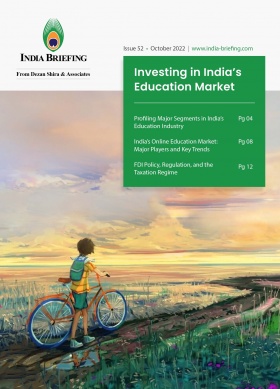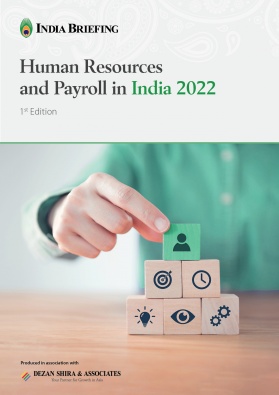How High-Tech Innovation is Advancing India’s Healthcare Capabilities
The COVID-19 pandemic revealed the scope for high-tech innovation in India’s healthcare sector, as entrepreneurs and technology start-ups sought to address long-standing challenges like limited access to quality care and inadequate infrastructure. Several digital disrupters now play a credible role in the healthcare ecosystem, offering solutions for telemedicine and patient-centric services, upgrading hospital management software, increasing efficiencies in hospital supply chain and pharmaceutical logistics, and supporting preventative healthcare as lifestyle diseases become more prominent. In this article, we discuss the leading technology trends in India’s healthcare sector and emergence of healthtech start-ups like Cult.fit, HealthifyMe, Pharmeasy, Innovaccer, Pristyn Care, etc.
The Covid-19 outbreak in 2020 triggered a prolonged period of economic disruption and necessitated several sectors to shift towards digitization to stay operational and competitive. Among those impacted, the healthcare sector faced huge challenges managing caseloads and providing normal healthcare services.
As pandemic-induced lockdowns across India caused mobility restrictions, the public and service providers turned to online platforms for patient-doctor consultations, diagnostics, and fitness and wellness solutions.
The aftermath also reminded India of the need to be self-reliant in the healthcare sector. The pandemic exposed shortcomings in the country’s healthcare infrastructure and the danger of import dependencies for critical items like bulk drugs (active pharmaceutical ingredients) and medical equipment, especially as major export markets like China closed off their supply chains due to a zero-Covid policy. Since then, the government and industry players have responded – through policy implementation and investments to improve and expand existing business models, respectively.
The federal government has launched a slew of measures, including the Telemedicine Guidelines 2020, Production-Linked Incentive (PLI) schemes for medical devices, and various sub-schemes for the promotion of pharmaceutical segments. Meanwhile, private players have begun offering innovative patient-centric products.
Healthcare business in India: Key growth drivers
Changes in the healthcare sector in India: Rise of HealthTech
In India, the traditional healthcare journey across pharmacies, doctors (for consultation), and diagnostics centers has witnessed a paradigm change. Factors like automation, digitization, and tech-enablement have revolutionized the way one perceives healthcare and expects services.
New healthcare technology (HealthTech) businesses like Practo, Healthkart, 1mg, DoctorInsta, Lybrate, etc. are focusing on closing key supply-demand gaps in the healthcare sector, such as by promoting services for early detection of disease, minimizing mental stress, detecting and preventing hereditary abnormalities, and enhancing consumer lifestyle.
Webinar – Exploring India’s Dynamic Start-Up Landscape: Key Insights and Investment Opportunities
Thursday, August 24, 2023 | 2:30 PM India Time / 11:00 AM CEST / 4:00 PM Vietnam Time / 5:00 PM China Time
India’s start-up ecosystem has surged to become a global leader, driven by a vast consumer market, government support, and skilled professionals in the engineering and technology domains. Foreign investors have taken keen interest, resulting in over 100 unicorns in a decade. Key sectors, including e-commerce, fintech, healthcare, and education, have witnessed disruptive innovations from startups in recent years.
Join Naina Bhardwaj, Senior Business Editor, Umair Ul Haque, Assistant Manager – International Business Advisory, and Shivi Jain, Program Director – India at German Accelerator, as they discuss India’s competitive advantage, government initiatives, and emerging sectors for start-up enterprises.
This webinar is in partnership with German Entrepreneurship. As a valued partner to start-ups, investors, corporations, universities and public organizations, German Entrepreneurship enables entrepreneurs by connecting and supporting the most relevant players within innovation ecosystems around the globe.
Topics covered in the webinar:
- Overview of India’s Start-Up Ecosystem
- Factors Driving India’s Start-Up Boom
- Key Insights and Emerging Sectors
- Government Initiatives and Policies
- India’s Competitive Advantage
- Future Outlook and Potential Challenges
- German Entrepreneurship in India
- Q&A Session
If you would like to get in touch with the speakers, or have any questions regarding this event, please contact Umair Ul Haque, International Business Advisory, India at Umair.haque@dezshira.com
This webinar is free of charge.
While the traditional healthcare system has been fraught with constraints, such as lack of equitable accessibility and affordability of quality care, the emerging digitized healthcare system has begun offering convenient, accessible, and low-cost services.
These HealthTech businesses employ cutting-edge technologies to ensure quick access to up-to-date medical information, genetic condition histories, and lifestyle choices to facilitate effective and fast treatment.
Overview of India’s HealthTech landscape
The Indian HealthTech industry, led by players like Pharmeasy, Reliance-backed Netmeds, Tata group-backed 1mg, Medlife, mfine, and MeddiBuddy, etc., is propelled by various trends. These include:
- Significant expansion of the digital infrastructure
- Emergence of paratelemedicine solutions
- Use of AI-integrated software
- Wider insurance coverage for remote health services
- Access to one-stop healthcare solutions
- Rise in consumer awareness regarding health
The HealthTech market will be further boosted in upcoming years with the continuing rise in consumer tech awareness, diversified eHealth models, advancements in technology, a growing number of eHealth start-ups, and support from the government.
According to data by INC42, the Indian HealthTech market, which stood at US$500 million in 2010, reached its tipping point during the Covid-19 outbreak, with an estimated market size of US$10.6 billion in 2022.
The segment is expected to grow exponentially to reach a market size of US$21.3 billion by 2025, acquiring a 3.2 percent share in the global HealthTech market.
A report by Red Seer estimates that the gross merchandise value (GMV) of the Indian e-health industry will reach US$9-12 billion by 2025 and US$40 billion GMV by 2040.
Telemedicine and online healthcare: Value proposition model
Investments in India’s HealthTech industry
The HealthTech industry in India secured private equity and venture capital investments worth nearly US$1740 million in 2021, marking a significant leap from US$1.4 million in 2014. Pharmeasy, the online pharmacy and medical store, witnessed the highest influx of investment of about US$650 million in 2021. It must be noted that most of these deals were concentrated in metropolitan cities. 37.9 percent of the total deals took place in Bengaluru (Karnataka), followed by 23.6 percent in Delhi-NCR, and 21.3 percent in Mumbai (Maharashtra). Other cities which have emerged in the HealthTech map of India are Pune (Maharashtra), Chennai (Tamil Nadu), and Hyderabad (Telangana).
Another notable trend in the Indian HealthTech funding landscape is the attractiveness of business-to-business – business-to-consumer (B2B-B2C) models among investors. While B2B-B2C business HealthTech start-ups raised US$756 million during 2014-2020, B2B remained the least funded segment in India. In 2020, B2C based HealthTech start-ups received a funding of US$194.8 million while B2B start-ups received merely US$6.8 million.
One of the leading investors in the Indian HealthTech sector is Accel Partners, having participated in over 12 deals with investment in start-ups like Cure.fit (now Cult.fit), PlusPin, Dailyrounds, Cure Joy, etc. Other notable investors include Sequoia, Matrix, Nexus, Pi Ventures, IDG Ventures India, etc.
India’s HealthTech landscape
Business models adopted by different HealthTech segments
Telemedicine
E-pharmacy – omni channel strategy
E-pharmacy – marketplace model
Online fitness and wellness
About Us
India Briefing is produced by Dezan Shira & Associates. The firm assists foreign investors throughout Asia from offices across the world, including in Delhi and Mumbai. Readers may write to india@dezshira.com for more support on doing business in in India.
We also maintain offices or have alliance partners assisting foreign investors in Indonesia, Singapore, Vietnam, Philippines, Malaysia, Thailand, Italy, Germany, and the United States, in addition to practices in Bangladesh and Russia.
- Previous Article Investing in India’s Education Market – New Issue of India Briefing Magazine Out Now
- Next Article Everything You Need to Know About Digital Banking Units in India


















